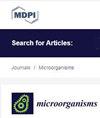解码伴侣动物的肠道微生物组:影响与创新
IF 4.1
2区 生物学
Q2 MICROBIOLOGY
引用次数: 0
摘要
伴侣动物 "的概念不断变化,其作为家庭成员在全球的地位日益提高,这凸显了肠道微生物群与宿主健康之间的动态互动。本综述全面介绍了伴侣动物体内维持整体健康和预防疾病所需的错综复杂的微生物生态。重点探讨了与肠道微生物群改变(菌群失调)有关的特定疾病和综合症,如炎症性肠病、肥胖症和癫痫等神经系统疾病。此外,本综述还分析了影响肠道微生物组丰度的各种因素,如年龄、品种、习惯性饮食和微生物靶向干预措施,如益生菌。报告回顾了包括基于 PCR 的算法、荧光原位杂交和 16S rRNA 基因测序在内的检测方法,以及这些方法的局限性和未来发展的需要。纵向调查、功能动态探索以及准确识别与特定健康问题相关的微生物特征为未来研究提供了广阔的前景。总之,本研究试图让人们更深入地了解影响伴侣动物健康的多种微生物物种的协调作用以及可能存在的物种特异性差异。本文章由计算机程序翻译,如有差异,请以英文原文为准。
Decoding the Gut Microbiome in Companion Animals: Impacts and Innovations
The changing notion of “companion animals” and their increasing global status as family members underscores the dynamic interaction between gut microbiota and host health. This review provides a comprehensive understanding of the intricate microbial ecology within companion animals required to maintain overall health and prevent disease. Exploration of specific diseases and syndromes linked to gut microbiome alterations (dysbiosis), such as inflammatory bowel disease, obesity, and neurological conditions like epilepsy, are highlighted. In addition, this review provides an analysis of the various factors that impact the abundance of the gut microbiome like age, breed, habitual diet, and microbe-targeted interventions, such as probiotics. Detection methods including PCR-based algorithms, fluorescence in situ hybridisation, and 16S rRNA gene sequencing are reviewed, along with their limitations and the need for future advancements. Prospects for longitudinal investigations, functional dynamics exploration, and accurate identification of microbial signatures associated with specific health problems offer promising directions for future research. In summary, it is an attempt to provide a deeper insight into the orchestration of multiple microbial species shaping the health of companion animals and possible species-specific differences.
求助全文
通过发布文献求助,成功后即可免费获取论文全文。
去求助
来源期刊

Microorganisms
Medicine-Microbiology (medical)
CiteScore
7.40
自引率
6.70%
发文量
2168
审稿时长
20.03 days
期刊介绍:
Microorganisms (ISSN 2076-2607) is an international, peer-reviewed open access journal which provides an advanced forum for studies related to prokaryotic and eukaryotic microorganisms, viruses and prions. It publishes reviews, research papers and communications. Our aim is to encourage scientists to publish their experimental and theoretical results in as much detail as possible. There is no restriction on the length of the papers. The full experimental details must be provided so that the results can be reproduced. Electronic files and software regarding the full details of the calculation or experimental procedure, if unable to be published in a normal way, can be deposited as supplementary electronic material.
 求助内容:
求助内容: 应助结果提醒方式:
应助结果提醒方式:


